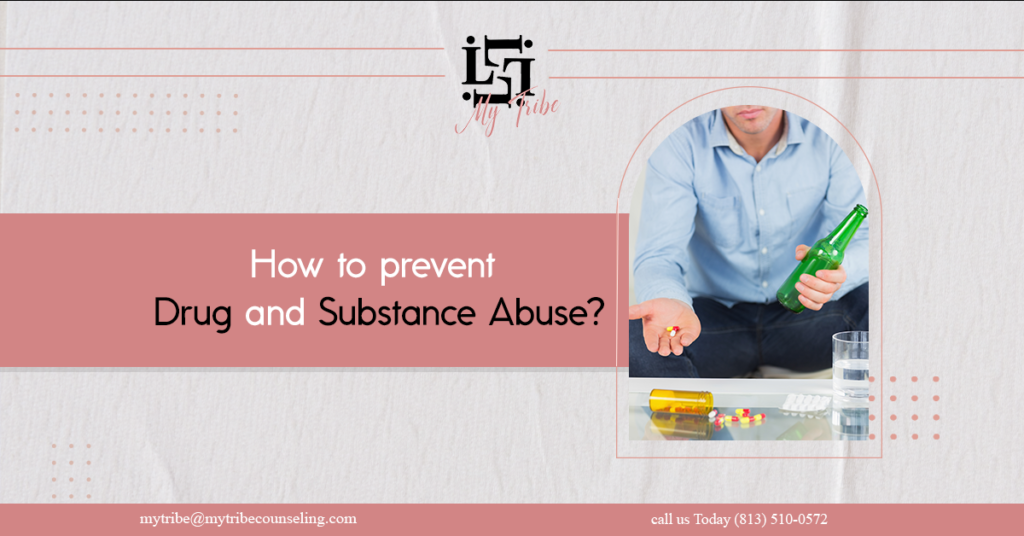Many people around the globe struggle with drug and substance use, impacting not just them but their loved ones, communities, and the broader society.
Thankfully, various approaches exist to fight addiction, aiding these individuals in reclaiming their lives.
This blog is a guide on how to prevent drug and substance abuse, revealing proactive measures, underscoring reliable prevention techniques, and affirming the essential role of emotional assistance.
The Reason Behind Drug and Substance Use
Acknowledging why individuals become involved with drugs or alcohol forms the foundation of prevention.
It’s not a one-size-fits-all answer.
For some, environmental issues—like growing up where substance use was common—might be the reason.
For others, grappling with mental health issues like anxiety or depression could drive them to self-soothe.
Even curiosity, pressure from friends, and past traumas can bear weight.
Understanding the triggers enables us to guide individuals away from potentially harmful activities, promoting healthier choices instead.
Looking at these elements guides us towards discovering effective ways of preventing drug abuse.
How to Prevent Drug and Substance Abuse
To stop drug and substance misuse, you need personal discipline, knowledge, and help from your community.
Here, we’ll explain some ways of preventing drug abuse to guard you or your dear ones from dangerous habits.
-
Learn and Teach Others
Knowing more leads to better decisions in preventing substance misuse. Understand the perils of drugs—physical, mental, and legal—and choose wisely.
Tell your loved ones, especially the youth, about it as they’re usually more at risk. Parents and carers should give children suitable advice about substance dangers.
Honest conversations dispel doubts and promote good choices.
-
Have a Solid Support Circle
A good support circle stops people from using substances during hard times. Be with friends and family who encourage the right things.
If a dear one is dealing with craving or active addiction signs, extend a helping hand.
-
Use Stress-Coping Techniques
Stress can lead to substance use. Avoid this by learning and using stress coping methods like staying present, deep breaths, yoga, or keeping a diary.
Constructive ways of dealing with hardships make you less likely to use harmful substances.
Creative outlets like painting, playing music, or exercising can keep you focused and calm, even in tough situations.
These healthy habits support how to stay drug free over the long term.
-
Avoid Risky Behaviors and Influences
Often, your company affects your choices. Avoid places with common drug use and move away from those who force you to partake.
A firm “no” helps you stick to your substance misuse prevention goals.
If you’re recovering from active addiction, cut off those or things that might lead to a setback.
Rather, value bonds and routines that match a healthier way of life.
Tackling Substance Abuse: Therapeutic Measures
Addiction Therapy as a Preventative Measure
Are you or anyone you know vulnerable to substance abuse? Turning to addiction therapy is the best proactive step you can take.
Therapy aids in controlling impulses, gaining insight into root problems, and developing grit.
Choose to connect with a therapist individually or in a group, the right guide can lead you on a path to recovery and self-confidence.
Self-help entities, like Alcoholics Anonymous provides continuous support led by peers.
These groups impart techniques to uphold responsibility, voice hurdles, and keep a clean living.
Such group-based journey plays a crucial role in acquiring skills to stay away from drugs.
Addressing Concurrent Challenges
Untreated or hidden mental health issues are significant triggers for substance abuse.
Issues like depression, anxiety, and trauma could escalate chances of substance use.
By going for addiction therapy, you can manage mental health issues and figure out how to survive without using harmful substances.
Prevention for Teens and Families
Adolescents often start experimenting with drugs. Parents and other caregivers have a crucial job—shaping young people’s views on drugs. H
Here’s a plan for families to prevent drug use:
-
Set Firm Guidelines
Speak to your young ones about the risks of drug use. Make sure to lay down the rules. This gives them a good grasp of limits.
-
Be a Positive Role Model
Little ones copy what they see adults doing. Stay away from drug use and show good methods of coping with stress or celebrating milestones.
-
Encourage Open Communication
Create a space where your kids can freely talk about their struggles or questions. Listen with empathy.
Guide them to make good choices.
-
Get Them Involved in Activities
Teens can be drawn to risky things when they’re bored or feel aimless.
Get them into hobbies, sports, or exciting activities. This improves relationships and gives them purpose.
Being positive also helps them stay drug-free over time.
Community-Based Solutions
To stop the rise of drug addiction, communities have the strength. They offer wisdom, tools, and backing circles.
Schools can bring drug abuse lessons into their curriculum.
Also, nearby associations can run educational programs and sessions to increase understanding.
The necessity of public strategies endorsing mental well-being benefits and assisting addiction centers is huge.
With the unity of communities focusing on prevention, safety, and health, the surroundings become better for everybody.
Staying Drug-Free is a Lifelong Commitment
Avoidance of substance and drug abuse isn’t a task done and dusted once. It’s ongoing and demands attention, awareness, and assistance.
Adding ways to halt drug abuse in daily life, seeking aid from others, and keeping one step ahead makes dodging dangerous acts easier.
If you’re on your journey back from addiction or dealing with temptations, don’t delay in asking for specialized aid.
A guide can assist you with efficient methods that keep you focused on adopting healthier routines.
My Tribe Counseling Can Help
Facing difficulty keeping away from drugs, or sustaining sobriety?
My Tribe Counseling provides empathetic, customized help for individuals and families dealing with such struggles.
Need assistance for addiction or methods to nurture a clean, drug-free life? You can count on us.
Reach out now and make the leap towards a more radiant life.
FAQs
What can be done to prevent drug abuse?
- Stopping drug misuse begins with learning about the dangers and results of using substances.
- Building meaningful support networks, managing stress in healthy ways, and staying away from places that support drug misuse are essential, too.
- Acting early and getting help from professionals when necessary can make a big difference.
What are 5 ways to stay drug-free?
- Spend time with friends and family who support you.
- Use techniques like mindfulness or physical activities to deal with stress.
- Stay away from places where people often use substances.
- Engage in enjoyable things or activities that make you feel valuable.
- Reach out to a therapist or support group if you need it.
How can we prevent drug abuse for Basic 4?
For children in Basic 4 (typically primary school age), avoiding substances begins with educating them in simple terms about the damage drugs cause.
Promote open dialogue, set clear rules, and involve them in positive activities such as sports or art to keep their interest.
What strategies are used to prevent substance use and abuse?
Necessary actions are educating about drug hazards, extending family and community support systems, encouraging healthy ways of dealing with stress, and creating strict rules to control substance availability.
Therapies and supportive communities play a vital role in avoiding and bouncing back from substance misuse.

